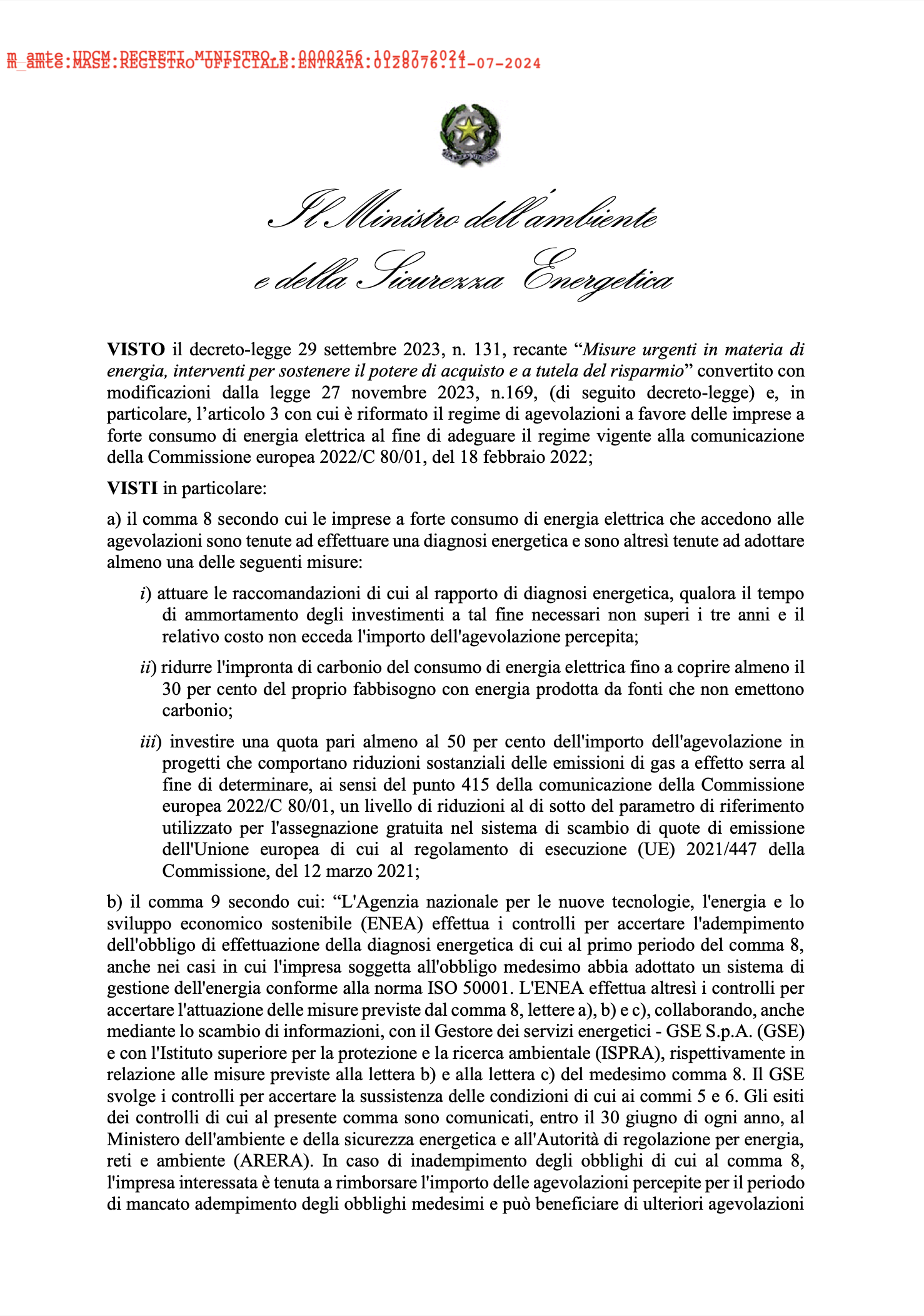
Starting in 2024, energy-intensive companies that wish to benefit from incentives must align with the new provisions from the MASE (Ministry of the Environment and Energy Security) by implementing measures to reduce their environmental impact. With the publication of Decree 256 of July 11, 2024, the Ministry of the Environment and Energy Security confirmed the “Green Obligations” outlined in Article 8 of Decree Law 131 of September 29, 2023.
New Rules for Energy-Intensive Companies
To benefit from incentives starting in 2024, companies must not only conduct an energy audit, but also implement at least one of the following actions:
A) Implementation of Energy Audit Recommendations
For each year in which a company receives incentives, it must select interventions from the energy audit report recommendations that meet the following criteria:
- Simple payback time not exceeding three years: The investment must pay off with the savings generated within this period, making the intervention more affordable and economically sustainable in the short term.
- Total investment costs not exceeding the amount of the received incentives: The company can only use the incentives to cover investments that match the value of the received incentives, ensuring no overspending.
Energy-intensive companies must also:
- Invest at least one-third of the value of the recommended interventions in the reference year.
- Complete the interventions within the second year after receiving the incentives.
B) Reduction of Carbon Footprint:
Companies that want to receive incentives must commit to reducing their carbon emissions. One way to do this is by ensuring that at least 30% of their total electricity consumption comes from carbon-free sources. This goal can be achieved in several ways, which can be combined, such as:
- Self-Generation of Electricity: Companies can produce their own energy from renewable sources like photovoltaic, wind, or hydropower plants. This reduces their dependence on external suppliers and limits carbon emissions.
- Long-term Power Purchase Agreements (PPA): Companies can enter into long-term contracts with renewable energy producers. These agreements ensure a stable supply of green energy at a fixed price and support the development of new sustainable energy plants.
- Purchase of Guarantees of Origin (Green Energy): Companies can buy certificates that guarantee a certain amount of electricity consumed comes from renewable sources. Though the energy used may not be directly produced from renewables, these certificates ensure that an equivalent amount of clean energy has been fed into the grid.
This solution is the simplest to apply, with the cost of green energy currently being competitive at around 3-4 €/MWh.
C) Reduction of Greenhouse Gas Emissions
Companies must invest at least 50% of the incentive amount into projects that reduce greenhouse gas emissions according to specific parameters. For this, ISPRA guidelines will be required.
Key Deadlines:
- By October 12, 2024: ENEA will publish a list of proposed interventions from the energy audit.
- By October 12, 2024: ENEA, GSE, and ISPRA will publish the implementation methods.
- By October 12, 2024: ARERA will define the declaration procedures for companies.
 Download the Decree 256 of July 11, 2024 here.
Download the Decree 256 of July 11, 2024 here.
The new provisions introduced by the MASE and confirmed by Decree 256/2024 represent a significant step towards sustainability for energy-intensive companies. By adopting measures to reduce environmental impact and improve energy efficiency, companies can benefit from significant financial incentives, thereby enhancing their competitiveness in a constantly evolving sector. With the commitment to cover at least 30% of energy needs through renewable sources and invest in emission reduction, companies comply with regulations, save money, and also demonstrate social and environmental responsibility, which is essential in today’s context.
In this regard, the team of engineers at Ciesse stands as an ally, ready to assist large companies during this important transition. Offering support from feasibility analysis to the practical implementation of necessary solutions, Ciesse has been guiding businesses for years in implementing effective and sustainable interventions, thus facilitating the shift towards a more responsible and environmentally friendly energy model.
For more information: +39 0931512235 or info@csgroupsrl.com.